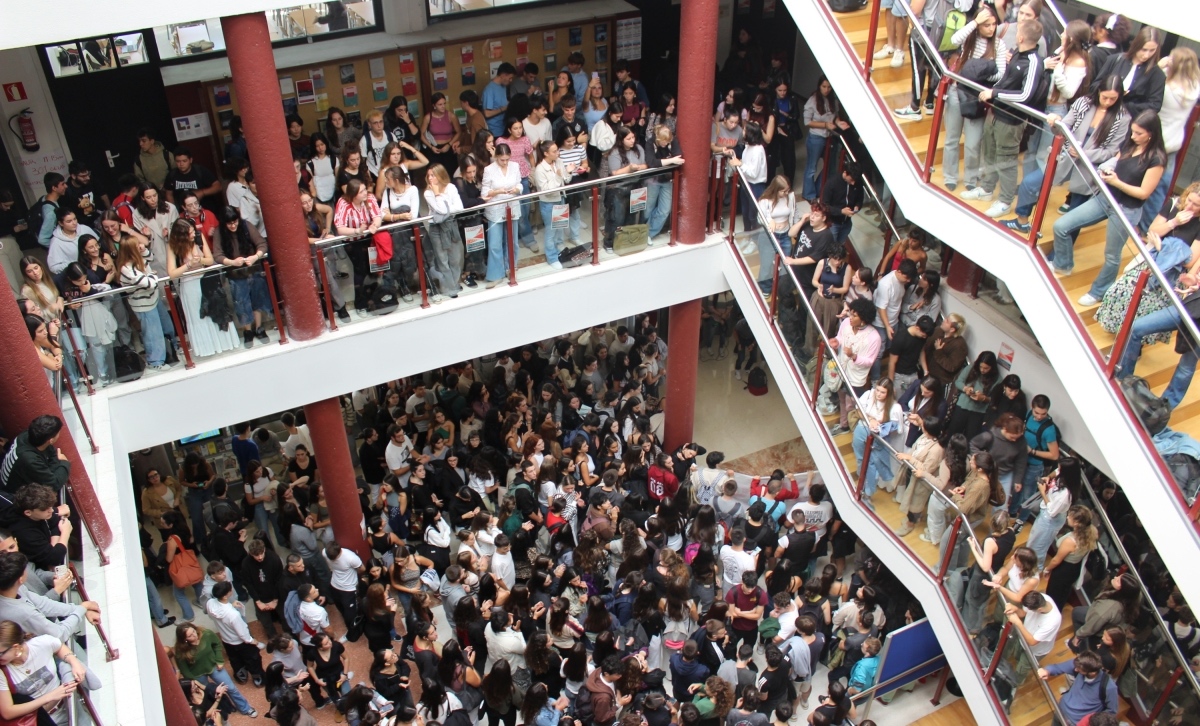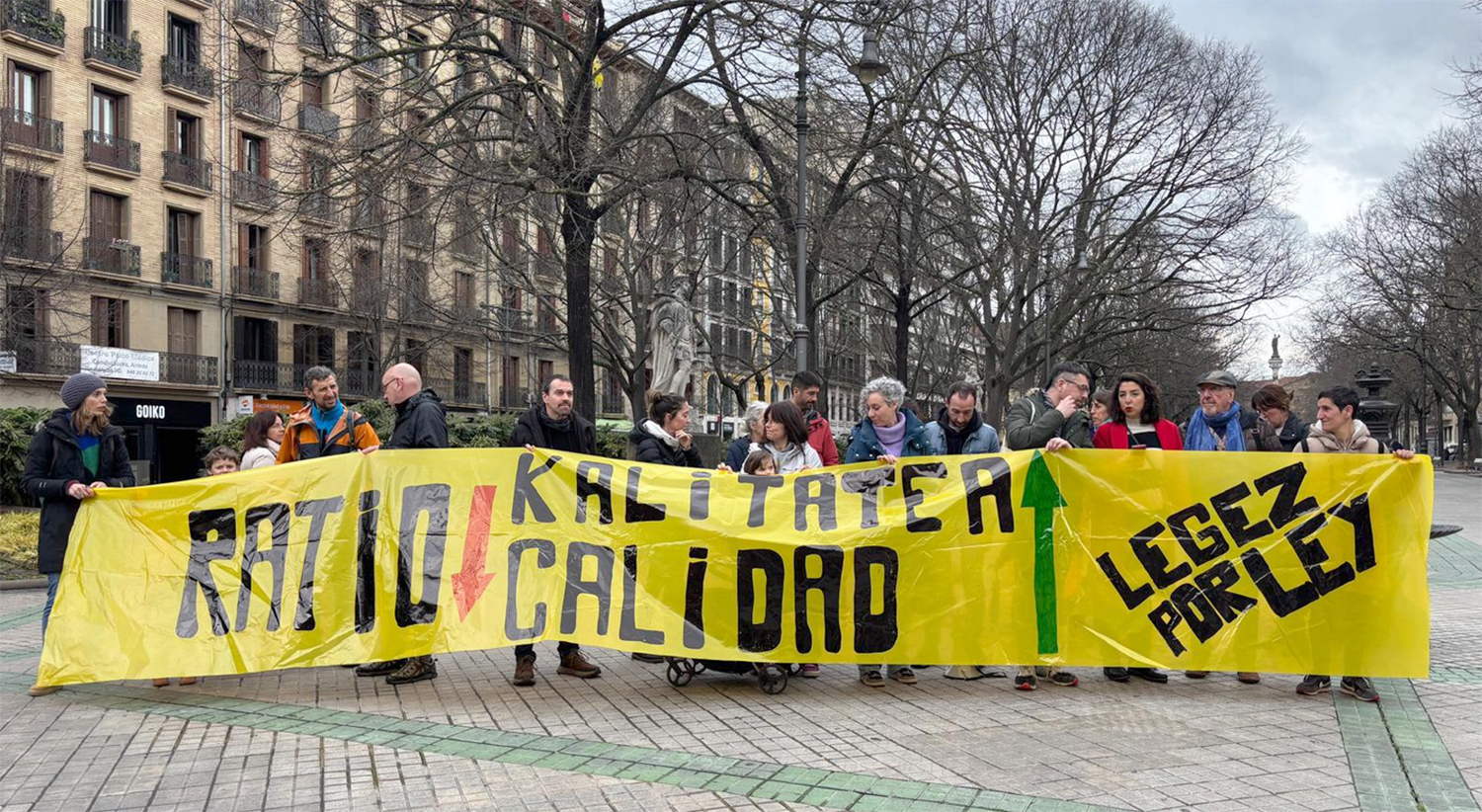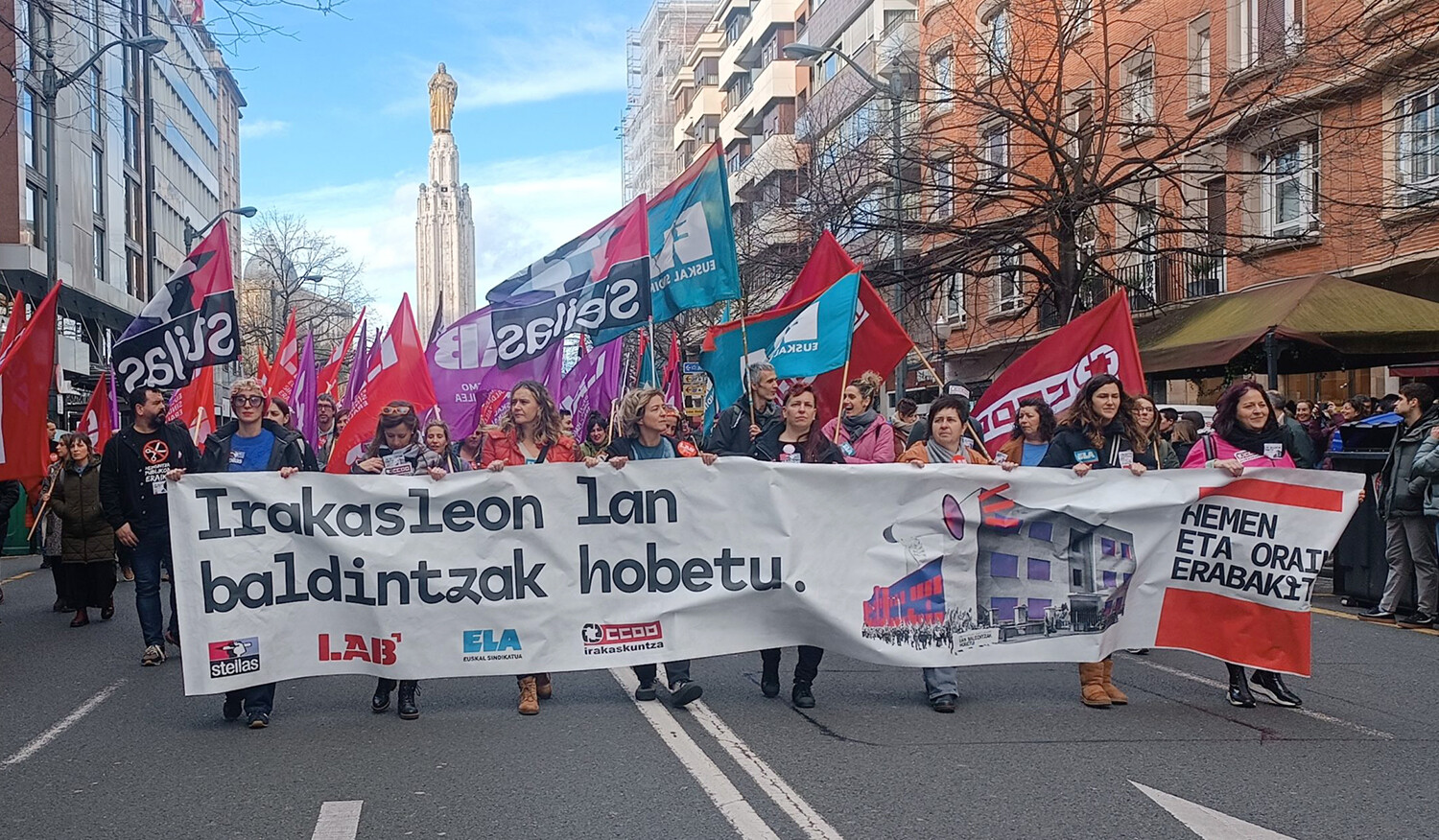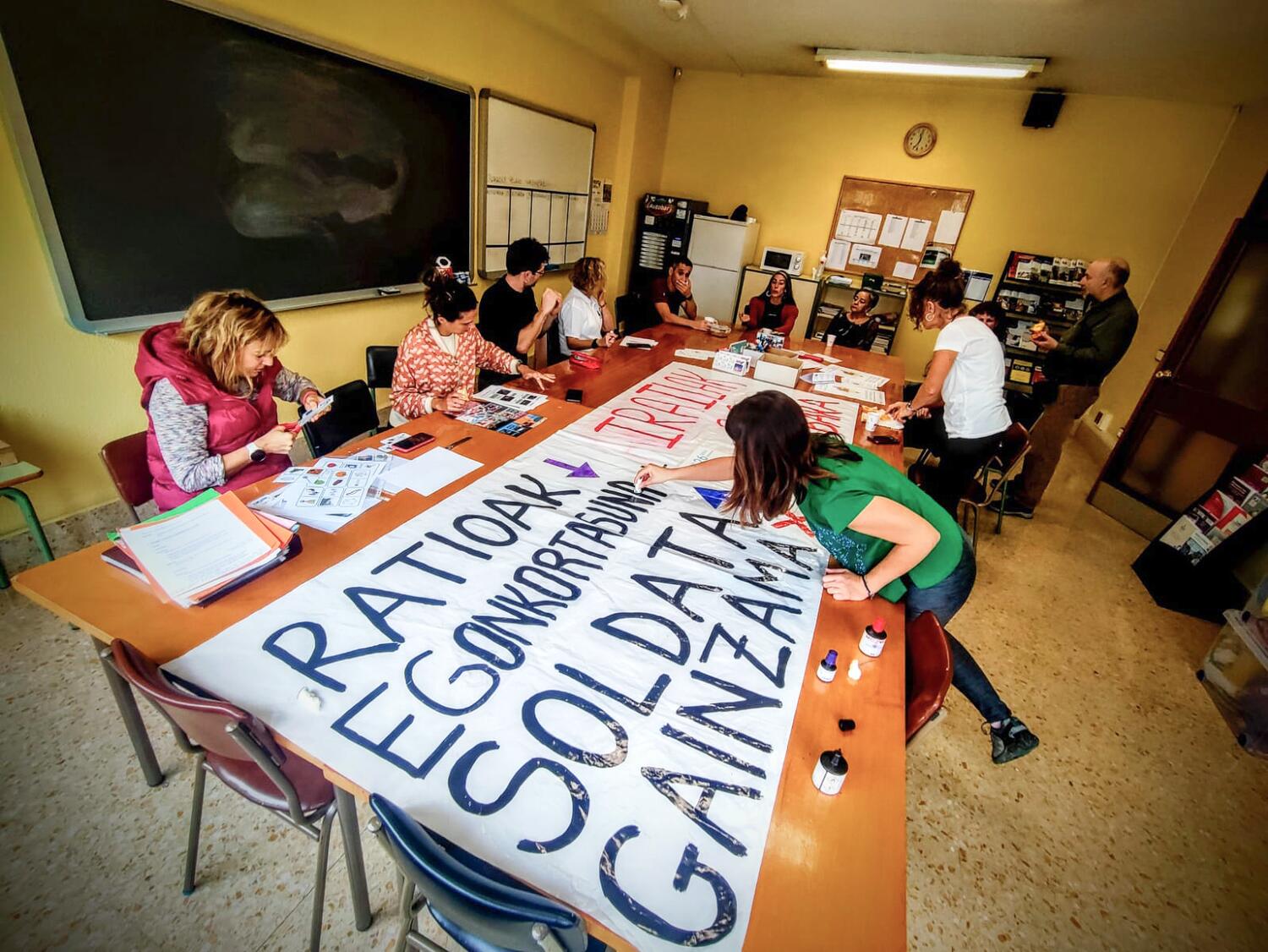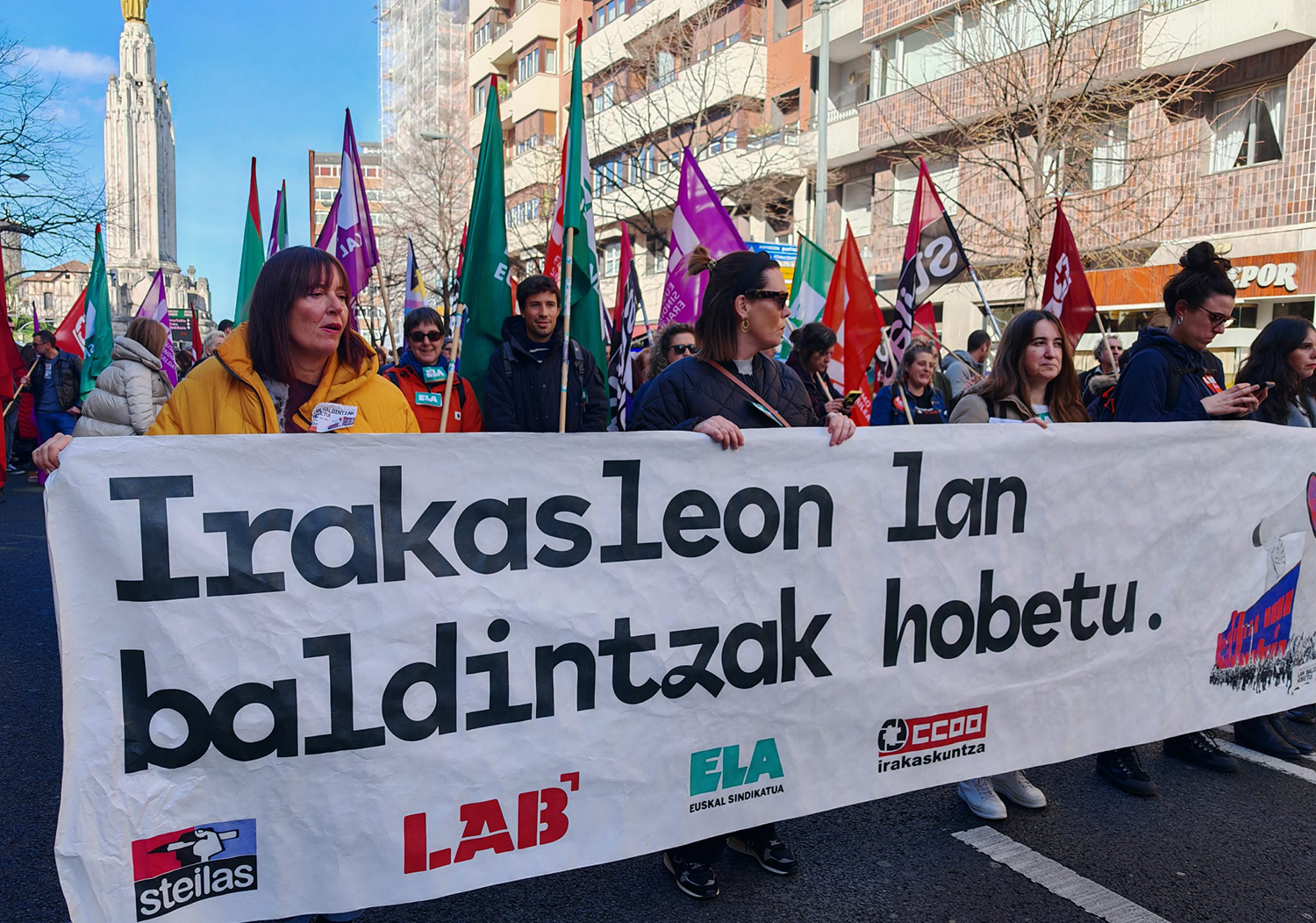"Many school areas in Bilbao are areas full of pollution and noise"
- The too small patio of cement, on the one hand, the school environment plagued with roads and cars, on the other, the vast majority of the associations of fathers and mothers of the city, along with their forces, have come to the City Hall to denounce and ask for the intervention of many schools in Bilbao: “We’re hitting our parents for improvements in schools, but we’re bumping into a huge bureaucratisation process.”

Parents’ associations from 28 schools have participated in the initiative. Considering that in Bilbao there are 33 public centers of Early Childhood and Primary Education, the participation has been high and Olatz Eskiroz has shown his satisfaction for the collaboration. As a member of the parent association of the Mujika school, we interviewed him at ARGIA.
What is, in general, the panorama of the school backyards and the school environment in Bilbao?
Bilbao is an old city, with a large population growing year after year. This means that many schools have many years on their backs, they are in old buildings and they have an influence on the subject we raise: they have cement courtyards and a few square meters, that is the general situation. In many schools there are not enough meters for the leisure, play and physical education that children need. In our school, for example, at Mujika School, we don't have outdoor courtyards, there's a small backyard on the last floor. In Atxuri and others, they do not have covered courtyards, every time it rains the children must be inside, with a very high noise level, it is stressful. And another of the most widespread characteristics is the lack of green areas, with a predominance of cement, in a very classical way.
With regard to school environments, Bilbao has a high density of cars, receives a huge tonne of cars on a daily basis, and many schools are surrounded by roads, both in the centre and in the neighbourhoods, and often school environments are areas full of pollution and noise. In other cities, measures are being taken to reduce the space of cars and to accommodate pedestrians, particularly in school areas, with the exception of a road lane, with the objective of more sustainable and greener cities. These measures have not been taken comprehensively here. It is true that the schools of Cervantes, Indautxu and La Concha have managed to make the environment partially pedestrian, as a result of the demands of the years, but each center is immersed separately in an endless struggle, managing the no. Tiboli College is a clear example: in its surroundings it has a very close sidewalk and at the time of leaving school all families accumulate in a very small space, very dangerous situations occur, and after years of fighting they have not yet managed to expand the sidewalk and to do so remove a lane from the road. In Atxuri, in front of the main patio, the children must stand three lanes and tram during the hours of their stay in the patio, with the immense degree of pollution and noise that this entails.
Our main concern is to see that over the years there is no priority intervention in the public schools of Bilbao, there is no comprehensive intervention to achieve an improvement and progressive updating of the public schools of Bilbao.
"In the vicinity of Tiboli College they have a very narrow sidewalk, all families are piled in a very small space, very dangerous situations occur and have not yet managed to remove a lane from the road"
What places do you want?
We want spaces where the well-being and cognitive and emotional development of our children is developed. We want a school in our city that guarantees social skills, physical and mental health, and for that we need to look at our demands and take concrete action in this regard. Pollution, noise and lack of space have been shown to have a direct negative impact on child development.
They have recently come to the City Council of Bilbao with a motion.
The order is not new. We have asked the City Council of Bilbao for an analysis of the situation and a gradual intervention based on it, since it is feasible, starting with the priorities, as we have seen in many other towns and cities. In the backyards, which analyze ratios, uses, green areas, quality, gender perspective... In the school environment, which investigate whether safety and health are guaranteed, what traffic we have in each school area and what influence this has on the children... The City of Bilbao will have to say where the priority is, in the vehicles or in the development of the children who move around that school.
What did the City Council of Bilbao answer and what do they expect from it?
The municipal government did not respond to the request, just as we did. The PNV-PSOE tabled an amendment to our motion and adopted a short text on it. According to the text, they are prepared to take steps in that direction. It is true that things are done in a very isolated way, but it is also true that we receive them not at all times and there is no comprehensive view of the issue. The picture is that parents are turning to technical committees to get improvements in schools, etc., but we are not given an adequate answer, that they transfer us to other departments, and that we ultimately clash with a tremendous bureaucratization process. The process began in Cervantes and Indautxu in 2019 and has not yet been completed, the Atxuri school also began in 2019 the process of finding a solution in the school environment and still has no solution. Tiboli, Uribarri, Mujika… There are several examples.
The Department of Education has told us that they intend to address the issue and to carry out an analysis and intervention on the environments, but we are rather sceptical about integrality: we fear that they will be patches, that they will not be limited to concrete and isolated interventions from the place.
"In Atxuri, in front of the main patio, the children must stand three lanes and tram during the hours of their stay in the patio, with the immense degree of pollution and noise that this entails"
What kind of intervention should be performed in the backyards and in the school environment?
We are seeing it in other big cities: we must make the roads disappear for cars and accommodate pedestrians, shield school areas and prioritize children, ensuring that schools are in a healthier environment. In Vitoria we have a very close example: the square meters of all the courtyards were measured, the green areas were reinforced, etc. The City Hall should assume the leadership and dynamization of all this.
On the other hand, we are optimistic, because many centres in Bilbao have had the ability to take dynamic forward and overcome administrative barriers. Bilbao is a big city, with many educational centers and with collaborative force, combining the needs of each with a global vision.
"No entiendo, en castellano por favor" eta gisakoak ohikoak dira eskolako guraso Whatsapp taldeetan, baina Irungo Txingudi ikastola publikoan euskara hutsean aritzeko modu erraz eta eraginkorra dute, behar duenarentzat itzulpen sistema berehalakoa ahalbidetuta.
Ez dakit nondik hasi, egia esan. Ordezkoa naizen heinean –irakaskuntzan ikasturte gutxi batzuk daramatzat lanean– eskola ugari ezagutu ditut Nafarroa, Bizkai eta Araban zehar. Lankide izan ditudan irakasleekin euskal eskolak dituen gabezien inguruan hitz egiten... [+]
“Gogo eta gorputzaren zilbor-hesteak: bi kate. Bi kate, biak ebaki beharrezkoak: bat gorputzaren bizitzeko, bestea gogoaren askatzeko”. Hala dio Mikel Laboaren kantak; hala izan da belaunaldiz belaunaldi, egun arte.
Gogoan dut nire gurasoak askotan joaten zirela... [+]
Matxismoa normalizatzen ari da, eskuin muturreko alderdien nahiz sare sozialetako pertsonaien eskutik, ideia matxistak zabaltzen eta egonkortzen ari baitira gizarte osoan. Egoera larria da, eta are larriagoa izan daiteke, ideia zein jarrera matxistei eta erreakzionarioei ateak... [+]
Elgarrekin izena du Duplak egin duen aurtengo abestiak eta Senpereko lakuan grabatu zuten bideoklipa. Dantzari, guraso zein umeen artean azaldu ziren Pantxoa eta Peio ere. Bideoklipa laugarrengo saiakeran egin zen.
Leporaturikoa ez onarturik, eta sare sozialetako kontuak "lapurtu" zizkiotela erranik, salaketa jarri zuen Arabako campuseko Farmazia Fakultateko irakasleak. Gernikako auzitegiak ondorioztatu du ez dagoela modurik frogatzeko mezu horiek berak idatzitakoak diren ala ez.
Seme-alabek eskolan dituzten ratioekin kezkatuta, Arartekoari kexa helarazi zion guraso talde batek, eta orain zuzenean Parlamentuari egin diote eskaera, “legez berma dadin gure seme-alaben hezkuntzaren kalitatean oinarrizkoa den neurria, unean uneko aurrekontuez edo... [+]
Ikasleen lan politikoa jazartzeko asmoz, Iruñeko Iturraman eta Biurdanan nahiz Bilboko Unamunon izan dira polizia-indarrak, IAk salatu duenez.
Memoria eta Bizikidetzako, Kanpo Ekintzako eta Euskarako Departamentuko Memoriaren Nafarroako Institutuak "Maistrak eta maisu errepresaliatuak Nafarroan (1936-1976)" hezkuntza-webgunea aurkeztu du.
570.000 familiak euren haurren ikasgeletako hizkuntza nagusia zein izango den bozkatzeko aukera dute martxoaren 4ra arte: gaztelera edo katalana. Garikoitz Knörr filologoaren eta euskara irakaslearen arabera, kontsultak "ezbaian" jartzen du katalanaren zilegitasuna... [+]
Uribe Kosta BHI institutuko hainbat ikaslek salatu duenez, mezu "iraingarriak, matxistak eta homofoboak" jaso dituzte Batxilergoko beste ikaskide batzuengandik. Horrez gain, gaineratu dute mezuak irakasle bati ere bidali dizkiotela eta beste ikasle batzuen... [+]
Aiaraldeko hainbat irakaslek mezua igorri diete ikasleen guraso eta familiei, dagoen informazio zurrunbiloan, grebarako arrazoiak modu pertsonalean azaltzeak euren borroka eta lanuztea hobeto ulertzeko balioko dielakoan.
Euskal hezkuntza sistemaren itunpeko eskolen gainkontzertazioa eta zentro pribatuen umeak hartzeko gaitasuna beherakada demografikoari eta biztanleriaren klase osaketari egokitu behar dira.
Grebaren bezperan Hezkuntza Sailak “edukirik gabeko” mahaia deitu zuela eta sindikatu deitzaileak “errespetatu gabe” akordioa “antzezteko” gutxiengoa duten sindikatuak “erabili” nahi izan zituela salatu ostean, beste bi greba... [+]
Nola azaldu 10-12 urteko ikasleei bioaniztasunaren galerak eta klima aldaketaren ondorioek duten larritasuna, “ez dago ezer egiterik” ideia alboratu eta planetaren alde elkarrekin zer egin dezakegun gogoetatzeko? Fernando Valladares biologoak hainbat gako eman dizkie... [+]










